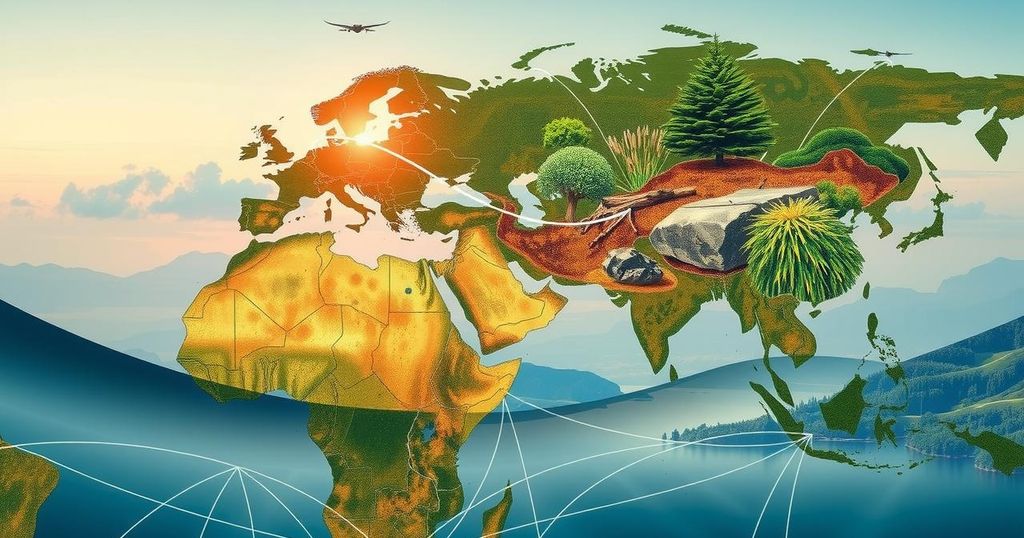Rwanda’s Actions in Congo: A Dangerous Parallel to Russia’s Aggression in Ukraine

The M23 rebel group has taken over Goma, Congo, leading to significant violence and displacement, paralleling Russia’s 2014 actions in Ukraine’s Donbas region. Rwanda supports the M23, framing their actions as protective while effectively allowing territorial grabs. This situation highlights a troubling decline in international norms against territorial expansion, with calls for increased global accountability to prevent further violence and chaos.
A severe situation is unfolding in Congo, where the M23 rebel group has taken control of Goma, the country’s largest city in the east, leading to fatalities among UN peacekeepers and displacing hundreds of thousands of residents. Many are unfamiliar with the M23’s motivations and actions, which can be likened to Russia’s intervention in Ukraine’s Donbas region in 2014.
In that year, Vladimir Putin annexed significant portions of Donbas under the guise of supporting local separatists, whom Russia had armed and guided. His administration claimed these forces defended ethnic Russians against persecution, denying direct military involvement, despite the evident presence of Russian troops aiding the rebels. Following Russia’s full-scale invasion of Ukraine, Putin integrated these self-proclaimed separatist territories into Russia.
Similarly, Paul Kagame’s regime in Rwanda has implemented comparable tactics in eastern Congo. The M23 rebels receive support from the Rwandan government, which asserts they protect Congolese Tutsis from exaggerated threats. This situation has enabled Rwanda to conduct territorial seizures in Congo while maintaining a facade of non-involvement. Observers note the presence of Rwandan troops in Congo, contradicting official denials.
Congo’s ongoing turmoil stems from this conflict, which has displaced over eight million people. The eastern region experiences rampant violence, with armed groups committing widespread atrocities, including looting essential resources. Notably, Rwanda, lacking significant domestic gold mining, has emerged as a major gold exporter, raising suspicions about illicit trade.
Though the Russia-Rwanda comparison has its limitations—particularly as Rwanda has not formally annexed territory, and Congo is marked by internal chaos—the parallels remain unsettling. Rwanda’s actions might be viewed as establishing a puppet state in Congo, with concerns growing about Kagame’s potential intentions to destabilize the Congolese government.
Rwanda’s aggression is not merely a legal violation; it represents a troubling indicator of a deteriorating global order. The traditional prohibition against territorial expansion is disintegrating, as evidenced by Putin’s actions, China’s maritime assertiveness, and discussions of American territorial expansion under President Trump. Such developments foster the conclusion that imperialist ambitions are resurging.
M23 first seized Goma in 2012, but international pressure forced Kagame’s regime to withdraw its support. However, the current geopolitical landscape weakens UN authority in Congo, leaving Rwanda with stronger alliances, including China, Qatar, and Turkey. American diplomacy under President Biden warned of Kagame’s expansionism, but administration policies remain uncertain under Trump.
Western nations exhibit conflicting sentiments towards Rwanda, a country perceived as orderly and effective in development initiatives. Nevertheless, it is essential to recognize Rwanda’s dependence on international aid and to exert more pressure on Kagame’s government. The potential consequences of inaction could lead to increased aggression from those who target weaker nations.
The article contextualizes current events in Congo, particularly the rise of the M23 rebel group and its implications for regional stability. It draws parallels with Russia’s annexation of territories in Ukraine, illustrating how these actions reflect diminishing international norms against such aggression. The article examines the historical and political dynamics involving Rwanda and Congo, detailing Rwanda’s military involvement and the broader implications for international relations. Rwanda’s relationship with various global powers, including the United States and emerging nations, impacts the current conflict and its potential outcomes. The history of armed conflict in the eastern part of Congo and the systemic issues of displacement and violence against civilians highlight a crisis that requires international attention and action. Intensifying conflicts in the region further emphasize the need for stringent measures against nations that resort to forceful territorial claims. The evolution of international relationships surrounding Rwanda’s actions calls for a renewed commitment to respecting sovereignty and addressing the consequences of military expansionism around the globe.
The situation in Congo epitomizes the alarming trend of territorial expansionism, mirroring tactics utilized by Russia in Ukraine. Rwanda’s support of the M23 and its grab of Congolese territory threatens to destabilize an already fragile region, calling for increased international intervention and pressure on Kagame’s regime. Failure to address these aggressions could result in a reinvigorated culture of imperialism, further endangering global diplomatic norms and igniting continued conflicts.
Original Source: www.hindustantimes.com








